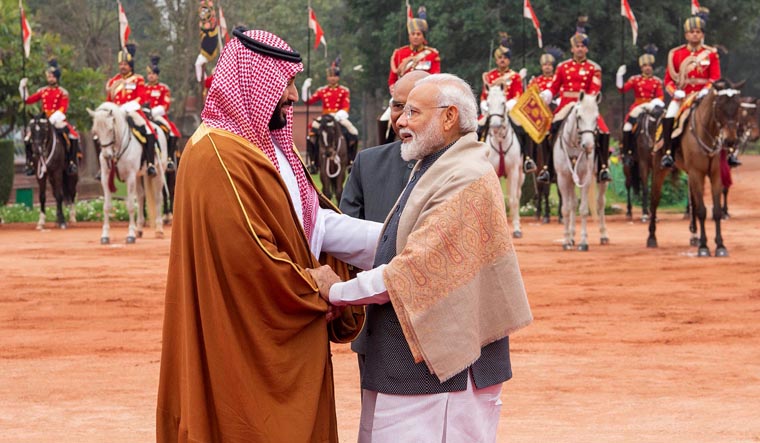The crown prince of Saudi Arabia, Mohammad bin Salman, might be the last prominent world leader to visit India before the country gets into election mode. The importance of this visit is underlined by the fact that Prime Minister Narendra Modi himself received Salman at the airport—a brand of hosting reserved only for very special guests. The timing of the visit, in the immediate aftermath of the Pulwama attacks, too, is significant. Getting an Islamic nation to denounce the attack was equally important.
Now that the prince has left for the next leg of his tour in Beijing, what is the assessment of his visit to New Delhi? South Block seems pretty upbeat with the outcome, emphasising that it was a very fruitful meeting. They point towards the key takeaways: the decision to establish a Strategic Partnership Council in both countries at the ministerial level, to be guided by the leaders themselves; the decision to have a comprehensive security dialogue at the level of National Security Advisors, and the setting up of a joint working group on counter-terrorism.
The Kingdom of Saudi Arabia (KSA) has decided to invest 100 billion dollars in India, across sectors that include, infrastructure, agriculture and refineries. New Delhi regards this as a great faith in India's robust economic growth. The prince, in fact, termed as “magnificent” the opportunities available in India for investment.
The joint statement issued at the end of the trip condemned the attack on Pulwama “in the strongest terms”, and the prince has agreed to India's line on cross-border terror funding and the need to get terror outfits and their leaders proscribed by the United Nations.
But, look carefully at the documents, and it is not difficult to notice that the outcome of the tour was rather modest. Even the strengthening of military ties is limited to a joint naval exercise, the date of which is yet to be decided. There are hopes that such exercises will be done with the Army and Air Force too, at some later date. Incidentally, it is not new for the Navy to exercise with KSA. They do this regularly when passing through the Red Sea, in what is called Passex or passage exercises. The new exercise will only be old wine in new bottle, albeit more planned.
Even KSA's announcement to join the International Solar Alliance, which is Modi's baby, is not such a big development. Over 100 countries are on board, including important technology suppliers like France.
Should India have expected more, given the way in which Modi has been wooing West Asia? He has made high optic trips across the region, including KSA, UAE, Oman, and even Palestine, Jordan and Israel. Despite the Act East focus of his government, it is actually his Gulf nation relations which have stood out.
For KSA, India is no doubt an important country. A regional power, a big supplier of manpower, as well as a big consumer of its chief exports—oil and gas. KSA is India's fourth largest trading partner, but the balance of trade is vastly in KSA's favour. India is also one of the eight strategic partnerships KSA has entered with, which again is a big deal for both countries.
On the other hand, Pakistan is also an important nation, not least because it is a part of the Islamic world. Imran Khan received an important bail-out package, 20 billion dollars that could inject some life into Pakistan's crumbling economy.
Thus, KSA has played a fine balancing act. While in Islamabad, the prince agreed that the countries should not try to politicise the United Nations list of sanctions, but in India, he said that terror outfits and their leaders should be blacklisted by the UN. Given that all these noises revolve around Masood Azhar, leader of the Jaish-e-Mohammad, which is responsible for most terror attacks against India, and which enjoys the patronage of Pakistan, the prince has done a fine balancing act. Are his statements contradictory? The jury is out on that point.
Again, the prince made the right noises about regional connectivity projects, read the Belt and Road Initiative. He agreed with India's stand that these projects should conform with internationally established rules and respect sovereign concerns. Yet, part of the funds given to Pakistan are likely to be used in projects around the Gwadar port area, part of the China Pakistan Economic Corridor, the showpiece of BRI.
Including Haj quotas and releasing 850 prisoners from Saudi jails (a little over 2,000 Indians are lodged there) sweetened the visit, as did the prince's compliments to Modi for having tried to work with Pakistan ever since he took charge. But, there was only a vaguely termed statement, to the effect that it was important to create the right conditions for resumption of dialogue with Pakistan.
India has been careful in its relations with KSA for a number of reasons. It kept a diplomatic silence on the murder of journalist Jamal Khashoggi. The outcomes of this visit may not be as spectacular as Modi would have wanted, but perhaps this is a long-term investment, which may yield a dividend much later, and when it is crucial. For instance, joining forces on counter-terrorism and intelligence gathering, in which KSA says it has expertise, could be very, very useful some day. Meanwhile, there is always the assurance that our energy security is ensured, for the present at least.



